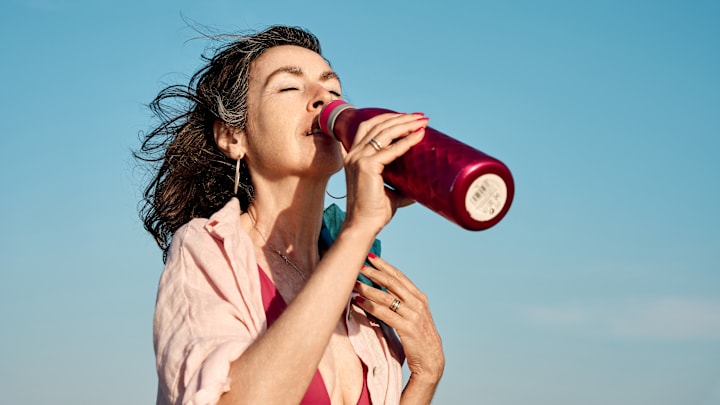In non-breaking news—it’s hot and getting hotter. And humidity only makes things worse, because it makes it harder for the body to cool itself. When weather gets this extreme, it’s important to take preventive steps to avoid serious consequences like heat stroke, which can be deadly. Take a look at some tips for coping with the heat.
- Drink a lot of water—and pay attention to your pee.
- Retreat to a cooling center near you.
- Eat out of the fridge and skip the cooking.
- Keep personal electronic devices charged.
- Stay in touch with friends and family.
- Head outdoors early or late in the day.
- Dress for the occasion in light clothing.
- Avoid freestanding fans if temperatures exceed 90°F indoors.
- Keep an eye on your pets’ behavior.
- Recognize the symptoms of heat-related illness.
Drink a lot of water—and pay attention to your pee.

One of the most important actions you can take during periods of extreme heat is to drink water, and plenty of it. Water helps regulate your body temperature, allowing it to cool off when the environment gets warmer. Cold water is better, so make sure you have water on hand in the refrigerator. According to the Red Cross, you should aim to drink a minimum of three-quarters of a gallon of water per day.
One way of tracking adequate water consumption is paying attention to your urine. Clear or slightly yellow urine is good—it means you’re getting plenty of fluids. If your urine is infrequent or the color of apple juice, you’re not drinking enough. And remember that children and the elderly can easily become dehydrated without knowing it, so make sure anyone in your family more susceptible to heat-related illness is drinking enough.
Retreat to a cooling center near you.

Home air conditioning units are a great way to keep cool during extreme heat events, but not everyone has access to one. If you find yourself getting uncomfortable, head to a public space like a library or shopping mall, or see if your community has opened a cooling center. Even a few hours spent in cool temperatures can help you avoid heat illness.
Eat out of the fridge and skip the cooking.

Stock up on foods that are either microwave-ready or can be eaten out of the refrigerator. Using your oven or stove during a heat wave can make your living area much warmer.
Keep personal electronic devices charged.

Extreme heat can prompt power outages or rolling blackouts as people crank up their air conditioning. If that happens, you don’t want to be left with a phone or other device on low power. Try to keep your phone fully charged. It’s also a good idea to have flashlights and fresh batteries handy if the power goes out.
Stay in touch with friends and family.

If people in your family or social circle don’t have air conditioning, live in a region of extreme heat, or have health issues that might make them more susceptible to heat-related illness, stay in touch to see if they need any assistance. This is especially important if they’re elderly and live alone, as we tend to lose the ability to regulate body temperature as we get older and symptoms of heat illness may not be as obvious.
Head outdoors early or late in the day.

If you have errands or household chores that require attention and they can’t wait, try to go out early in the morning or later in the evening to avoid peak afternoon temperatures.
Dress for the occasion in light clothing.

Loose-fitting, lightweight clothing made of natural fibers is your best bet for keeping cool. Light-colored shorts, T-shirts, and tank tops made of cotton or linen are breathable and will help you regulate your body temperature. Polyester and other synthetic materials don’t breathe as easily, meaning they'll make you sweat but not allow the perspiration to evaporate and cool you down. And darker clothing can absorb heat, which is the last thing you want to happen.
Avoid freestanding fans if temperatures exceed 90°F indoors.

If your thermostat climbs to 90°F or more, you should be looking for a cooling center or alternate accommodations until the temperature drops off. But if you find yourself in a broiling apartment or house, close your shades and drapes to keep out direct sunlight and don’t try to use a freestanding electronic fan to cool off. As indoor temperatures approach your own body’s temperature, the fan will simply blow the hot air toward you, negating any positive benefit and possibly hastening dehydration.
Keep an eye on your pets’ behavior.

Dogs cool off by panting, but they’re not always able to keep up with extreme temperatures. If your pet seems listless and unable or unwilling to move, they may be suffering from the heat. You should take them to a veterinarian immediately.
Recognize the symptoms of heat-related illness.

Everyone’s heat tolerance varies, but prolonged exposure to extreme temperatures can begin to make you feel ill. Heat exhaustion is indicated by symptoms like heavy sweating, weakness, and digestive issues. Retreating to a cool area, resting, and drinking plenty of fluids should help alleviate them. Heat stroke is far more serious and is usually characterized by a body temperature over 103°F, red skin that doesn’t produce sweat, rapid pulse, and confusion. Heat stroke requires immediate medical attention, so call 911 if you suspect you or someone in your household might be sick.
Read More About Summer Weather:
A version of this story originally ran in 2022; it has been updated for 2025.
